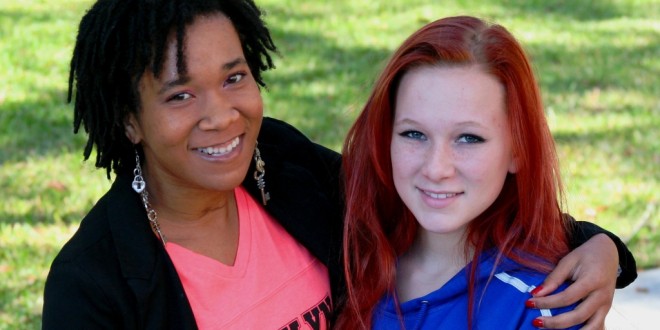When Sociology Prof. Shelley Grant first envisioned a mentor project for her Media and Crime students three years ago, she hoped for just the kind of outcome she got with JaNay Burrows and Kamryn Satterwhite.
Burrows, 23, a junior Social Science major, and Satterwhite, 15, a Terry Parker High School sophomore, linked up as part of Grant’s class this fall, and they hit it off.
 The pair met weekly and shared their achievements and challenges. Both liked to express themselves. Both were huge fans of dance. Not long after they connected, Burrows worked to get Satterwhite lessons at a nominal cost with acclaimed local dance instructor Morgan Brown.
The pair met weekly and shared their achievements and challenges. Both liked to express themselves. Both were huge fans of dance. Not long after they connected, Burrows worked to get Satterwhite lessons at a nominal cost with acclaimed local dance instructor Morgan Brown.
“This whole experience with the mentoring and Prof. Grant’s class has been amazing,” Burrows said during a campus tour and luncheon Thursday, Dec. 4, for this semester’s 26 mentors and their 26 Arlington mentees. “Her course goes way beyond lectures. We get to voice our opinions, work with juveniles and get hands-on experience. I learned a lot about one-on-one listening skills with Kamryn. We definitely plan to stay in touch after this is done.”
Kamryn, who said she’s embarked on a new path after experiencing troubles in and out of school in the past, agreed.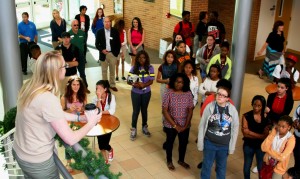
“It’s been so great to have a friend every week. I really look forward to it,” she said. “I’ve gone through a lot as a teen, and she helped straighten me out.”
The service-learning aspect of the class partners Jacksonville University students with youths at Arlington Middle School, Ft. Caroline Middle School and Terry Parker High School. The mentees are part of the Communities in Schools Jacksonville dropout prevention program and may have dealt with emotional, family, legal or other troubles.
In addition to coursework learning community perceptions of the criminal justice system and those who violate the law, with special emphasis on juvenile justice and juvenile offenders, Grant’s students use the mentoring relationships to challenge common myths and stereotypes regarding youths and delinquency, and they have an opportunity to have a voice in the community’s perception of juveniles.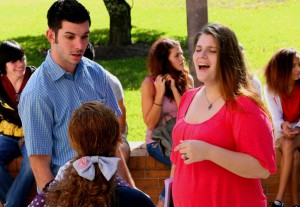
“The students develop meaningful relationships with youths who desperately need a positive adult role model,” Grant said. “They also benefit by stepping out of their own comfort zones and helping young people … these are kids who could be in similar situations to what we have been seeing in the media.”
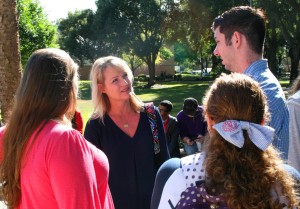
Grant noted that surveys completed by her JU students in the fall of 2013 showed that following the service-learning project, students overall had more positive attitudes about juveniles in general and were more supportive of rehabilitative approaches in the treatment of juvenile offenders.
At the tour and luncheon event, the JU students and Arlington youths heard from JU President Tim Cost, a 1981 alumnus, who said he benefited from relationships with mentors at every stage of his three-decade business career, which included senior-level executive positions at Fortune 500 companies.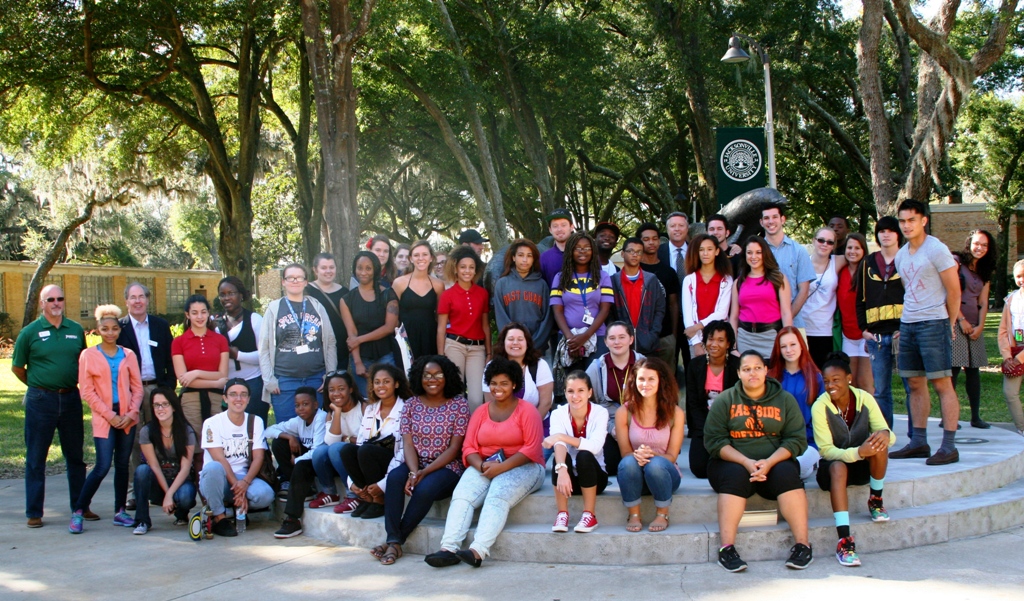
“To our mentors, you are giving an incredible gift and filling a critical role that will influence these youths for the rest of their lives,” he said. “And to our mentees, I encourage you to pay this forward. Find someone a few years younger than you who can benefit from what you know and have to offer.”
Victoria Carlucci, mentor coordinator for Communities in Schools, praised Grant, her students and Jacksonville University for going above and beyond to make a difference for area youths.
“JU did great with this program, and Prof. Grant’s students were very creative in coming up with activities for their mentees. These youths got experience speaking with adults, and saw that someone cares,” she said. “A mentor relationship can have a huge effect on a young person’s decision-making skills and self-image.
“Having someone who’s cool and in college take time out of their busy life — that means a lot to these kids.”
 Wave Magazine Online Jacksonville University News Hub
Wave Magazine Online Jacksonville University News Hub
